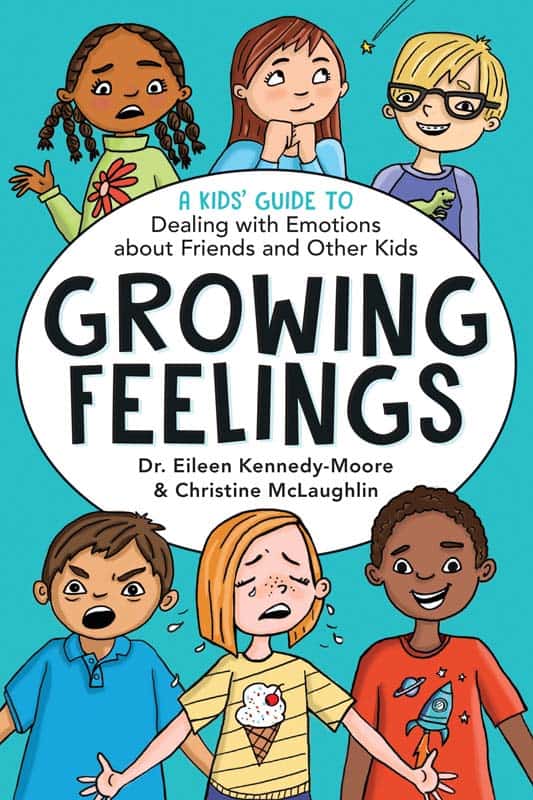Friends and Feelings: Expert Tips to Help Your Children
Friendships come with feelings that children don’t always know how to handle. Knowing how to respond in the face of anxiety, jealousy, anger and guilt could determine whether their relationships blossom or wither. Licensed psychologist Eileen Kennedy-Moore, author of “Kid Confidence” and “Growing Friendships,” shares some tips about friends and feelings from her latest book, “Growing Feelings.”

What should we parents advise our children when they feel shy or anxious around friends or other kids?
The most important thing to know about anxiety is that we must stay in the water to get used to it, and no amount of standing at the edge of the pool is going to help kids get used to the water. So, no amount of avoiding being around other kids is going to help kids get used to it.
Often what gets in the way of kids reaching out is what I call the “Magnet Myth” of friendship. That’s the belief that we have to be so amazing and wonderful that people are drawn to us the way a magnet attracts metal. That’s not how friendship works. We don’t have to be amazing.
As far as actions are concerned, it may be helpful to have some idea of what to say. One example is the great-plus-one-fact formula. When someone asks, “How are you?” Or “How was your weekend?” if we just respond, “Fine,” that’s a conversation ender. If we respond with “Great!” that shows enthusiasm. Then if we add one fact, something the listener can picture in their mind, that keeps the conversation going.
How about feeling jealous, like when a friend has another friend?
That’s a hard one! There are two things that definitely won’t work: One is being an octopus friend and trying to squeeze the friend tightly and keep them all to yourself. That will just make the friend want to get away! The other is trying to divide the friend evenly and keep score about what you get and what the other friend get. If you look for unfairness, you’re going to find it. A friend is not a birthday cake that you can cut into pieces.
One way to handle this situation is to try to befriend the friend’s friend. If your friend likes that kid, you might, too. It’s also a kind thing to be open to that friendship.
But friendship threesomes can be tricky. If you picture a triangle where each point represents a kid, it’s hard to keep every line connecting them exactly the same at all times. So, another good strategy is to expand the triangle by including a fourth or even a fifth friend. That tends to lower the tension.
What about guilt? How can kids handle that?
Guilt is useful because it’s that pinch of conscience that tells us, “Ooh, I shouldn’t have done that.” It’s important to recognize that everyone makes mistakes, and we can learn from them. One of the best things to do when we’ve hurt someone is to apologize.
What’s the best way to apologize?
We need to say, “I’m sorry for…” and say what we did. Then, if we can, say what we’re going to do to make things right or from now on. Also, never apologize more than twice because that erases the apology. Think about it: the first apology is good, the second apology, we might add for emphasis, but after that? Saying, “I’m sorry! I’m sorry! I’m sorry! I’m sorry!” shifts the attention off the injured person and onto you, so they have to comfort you, which is backward!
What about anger? We, as adults, can have a hard time dealing with this emotion. What about children?
It’s tempting to lash out when we’re angry, but there’s zero possibility that someone will respond to nastiness by being nice. The louder we yell, the harder it is for people to hear us, because they don’t want to listen!
Sometimes, I hear kids say that they argue all the time with their friend. Well, then their friendship is at risk. If there’s too much conflict, a friendship won’t survive. The effects of positive and negative actions on friendships are not equal. Doing kind things for a friend or having fun with them is like adding a marble to a bag; it adds up little by little. Doing something mean is like ripping the seam out of the bottom of the bag– all marbles drain out quickly.
What’s the best way to handle it when you realize you’ve been unkind to a friend or vice versa?
We adults tend to want kids to talk everything out, and it’s important for kids to learn how to do that using “I” statements, avoiding accusations, listening as well as talking. But negotiation and compromise doesn’t become the main way kids resolve conflicts until age 19. Often kids get past rough spots by just separating for a bit, so tempers can cool, and then coming together and just being kind.
If your child has a question about friendship, submit it at DrFriendtastic.com and then listen for the answer on Dr. Kennedy-Moore’s podcast, Kids Ask Dr. Friendtastic
Originally published in the August 2023 issue of Tampa Bay Parenting Magazine.

